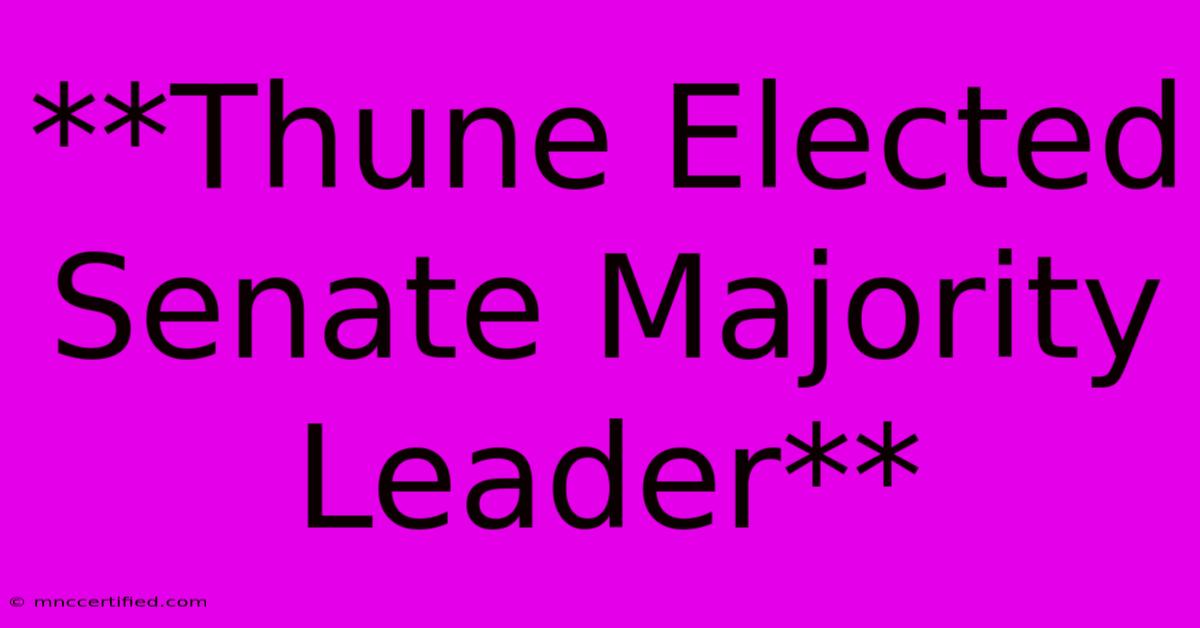**Thune Elected Senate Majority Leader**

Table of Contents
Thune Elected Senate Majority Leader: A New Era for the GOP?
John Thune, the Republican senator from South Dakota, has been elected as the new Senate Majority Leader, succeeding Mitch McConnell who held the position for a record 16 years. This shift in leadership marks a new chapter for the Republican party and could have significant implications for the upcoming legislative agenda.
Thune's Rise to Leadership: A Look Back
Thune, a former House Representative, first entered the Senate in 2005. Known for his sharp political acumen and fundraising abilities, he quickly rose through the ranks of the Republican party. His moderate stances on some social issues, coupled with his conservative fiscal policies, resonated with a broad base within the party.
Thune's election as Majority Leader signals a potential shift in the GOP's approach. While McConnell was known for his unwavering adherence to conservative ideology, Thune is considered more pragmatic, willing to compromise and build consensus.
What Does Thune's Leadership Mean for the Future?
While Thune's leadership is expected to be more collaborative than McConnell's, it remains to be seen how this will impact the legislative process. Some key questions remain:
- Will Thune be able to bridge the divide within the Republican party? The GOP has become increasingly polarized, with a vocal minority holding significant sway. Thune's ability to navigate these internal divisions will be crucial for his success.
- How will Thune approach working with the Democrats? The Senate is narrowly divided, making bipartisanship essential for passing significant legislation. Thune's willingness to compromise and find common ground will be key to legislative progress.
- What will Thune's priorities be? His focus on economic issues, including tax cuts and deregulation, suggests a continuation of the GOP's economic agenda. However, he may also prioritize areas such as infrastructure and energy policy.
The Road Ahead: A New Era in the Senate
Thune's election as Senate Majority Leader marks a turning point for the Republican party. While the ideological divisions within the GOP remain, Thune's leadership style and priorities could reshape the party's approach to governing.
His success in navigating the complexities of the Senate, fostering collaboration, and achieving legislative wins will be closely watched. This new era in the Senate promises to be dynamic and potentially transformative, and the outcome will be shaped by the decisions and actions of John Thune and his colleagues.
Keywords: John Thune, Senate Majority Leader, Republican party, Mitch McConnell, GOP, legislation, leadership, bipartisanship, compromise, economic issues, tax cuts, deregulation, infrastructure, energy policy, politics, government, Congress.

Thank you for visiting our website wich cover about **Thune Elected Senate Majority Leader**. We hope the information provided has been useful to you. Feel free to contact us if you have any questions or need further assistance. See you next time and dont miss to bookmark.
Featured Posts
-
Green Bay Packers Sign Bellevilles Mike Nolden
Nov 14, 2024
-
How To Look Up Someones Insurance Information
Nov 14, 2024
-
Spurs Beat Wizards Wembanyamas Debut Wins
Nov 14, 2024
-
Megalopolis Movie Streaming Find It Online
Nov 14, 2024
-
Simple Investment Agreement Doc Free
Nov 14, 2024